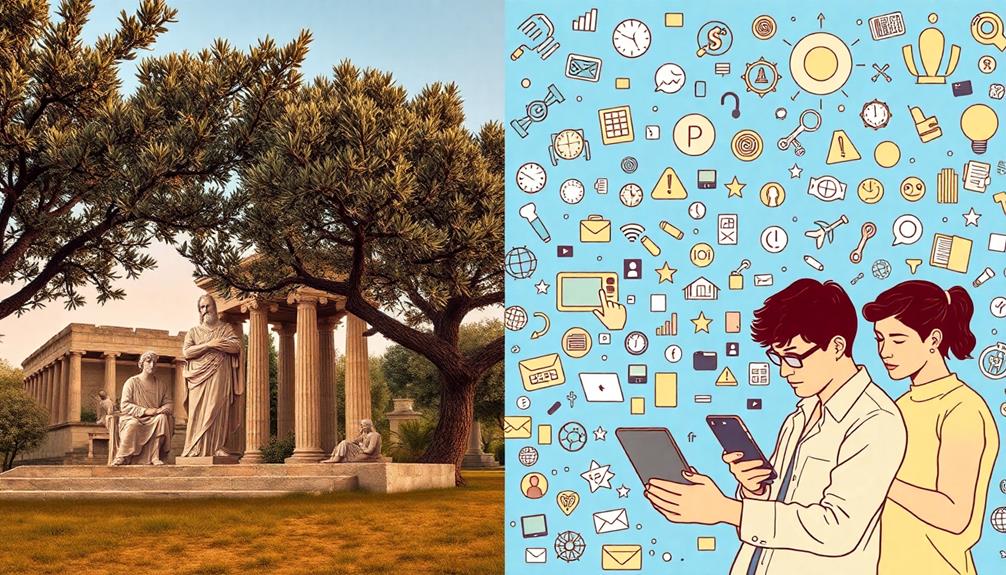You can learn crucial lessons from the fallacies of Greek thought that are still relevant today. Recognizing fallacies like ad hominem attacks and circular reasoning helps you navigate complex discussions with clarity. Emphasizing critical thinking fosters deeper insights into ethical dilemmas and moral truths. Ancient Greeks valued the balance between mythos and logos, encouraging a nuanced approach to understanding human nature. By questioning assumptions and embracing complexity, you'll improve your arguments and enrich your perspective. This approach not only elevates personal debates but also enhances the quality of public discourse, making it essential for informed conversations going forward.
Key Takeaways
- Recognizing and avoiding fallacies like ad hominem and false dilemmas can enhance the quality of modern political discourse.
- Embracing complexity and multiple perspectives fosters richer discussions and ethical understanding in contemporary society.
- The Socratic method encourages critical questioning, helping individuals discern sound reasoning from manipulative rhetoric.
- Awareness of historical context aids in preventing the repetition of past reasoning mistakes in current debates.
- Continuous inquiry and self-reflection are essential for intellectual growth and navigating complex societal issues.
Understanding Mythos and Logos
Understanding mythos and logos offers a fascinating glimpse into the foundations of ancient Greek thought. Mythos encompasses the rich tapestry of cultural wisdom and allegories found in works like Homer's "Odyssey" and "Iliad." These narratives explore human nature and the cosmic order, providing moral truths that resonate across generations.
You'll see how mythos isn't just a collection of stories but a means to investigate the complexities of life and ethics. As contemporary discussions on meaning resonate with existential themes, philosophical exploration encourages deeper self-reflection.
On the other hand, logos represents the logical reasoning that philosophers like Socrates championed. They emphasized rational argumentation as a method to uncover objective truths and interpret the world around you. The ancient Greeks viewed mythos and logos as complementary forces; each plays an essential role in enriching your understanding of human experience.
Unfortunately, modern interpretations often reduce mythos to mere fiction, overlooking its potential to convey timeless truths through symbolism. This disconnection can lead to a loss of valuable ethical insights that mythos offers.
The Interplay of Myth and Reason

Myth and reason intertwine in a dynamic dance that shapes our understanding of the world. The ancient Greeks recognized the essential balance between mythos and logos, where mythos conveyed moral truths and cultural wisdom through epic narratives like Homer's "Iliad" and "Odyssey." These stories grounded their society's values, while philosophers such as Socrates championed logos, emphasizing reasoned arguments and critical inquiry to discover objective truths.
This duality can be likened to the insights of utilitarian thinkers' declarations, where the pursuit of happiness is grounded in both rational thought and moral narratives that resonate with the human experience.
This interplay between mythos and logos enriched Greek thought, allowing for a deeper comprehension of human experiences. By integrating cultural narratives with empirical scrutiny, they created a framework for understanding life's complexities.
However, modern interpretations often oversimplify mythos as mere fiction, overlooking its potential to reveal timeless truths about human nature and ethical frameworks.
In today's fast-paced world, a nuanced understanding of both mythos and logos is vital. It encourages a holistic approach to ethical decision-making amidst complex social issues, reminding us that reason alone can't capture the full spectrum of human experience.
Embracing both elements can guide you toward more profound insights and empower you to navigate the moral landscape with wisdom and empathy.
Relevance of Greek Fallacies Today
Greek fallacies still resonate today, reminding us of the importance of sound reasoning in our discussions. The fallacies found in Greek philosophical dialogues, like equivocation and circular reasoning, highlight the need for clear definitions and logical consistency in contemporary discourse.
When you examine ad hominem attacks in works such as Plato's "Apology," you can learn to recognize and avoid personal jabs in debates, fostering a more constructive dialogue. Moreover, engaging in practices that enhance emotional intelligence can improve our interactions and help us navigate complex discussions with greater ease, as seen in the principles of navigating relationships in the Vortex.
The "Euthyphro Dilemma," which questions the nature of piety and divine command, underscores the complexities of moral reasoning that are still relevant in today's ethical discussions about morality's foundations.
Additionally, analyzing the false dilemmas in dialogues like "Gorgias" can sharpen your critical thinking skills, helping you identify oversimplifications and explore more nuanced perspectives in modern arguments.
Lessons From Essentialist Thought

When you examine essentialist thought, you'll notice how it leads to misguided political philosophies and oversimplifies identity.
By categorizing people based on fixed traits, it often ignores the rich complexity of individual experiences. This is similar to how relationships can be impacted by rigid communication styles, as highlighted in the principles of fostering trust through open communication.
It's vital to recognize these pitfalls to foster a more nuanced understanding of identity in today's society.
Misguided Political Philosophies
While essentialist thought may offer a tempting framework for understanding identity and society, it often leads to misguided political philosophies that undermine democratic values. When you embrace essentialism, you risk promoting fixed traits and inherent characteristics, which can foster elitism and disdain for diverse perspectives.
This mindset can easily align with collectivism, creating totalitarian attitudes that simplify complex social dynamics into binary categories of oppressor versus oppressed. In the domain of family dynamics, for instance, supporting children through divorce emphasizes the need for open communication and emotional expression, showcasing the complexity of individual experiences rather than reducing them to essentialist labels.
Moreover, political philosophies rooted in essentialism frequently overlook individual experiences, reinforcing systemic discrimination and exacerbating social divisions.
In contemporary society, this is particularly damaging as it perpetuates stereotypes and ignores the rich nuances of identity. The critique of essentialist reasoning within Critical Race Theory highlights the importance of recognizing race as a social construct, urging you to move beyond simplistic classifications.
Oversimplification of Identity
Essentialist thought often leads to an oversimplification of identity, reducing the rich tapestry of human experiences into rigid categories. When you embrace essentialism, you might overlook the unique experiences and intersections that define individuals within those groups.
This reductionist view can perpetuate systemic discrimination by reinforcing stereotypes, framing social issues in binary terms of oppressor and oppressed. Furthermore, the use of predictive modeling in educational data mining can provide insights into the diverse needs of students, highlighting how essentialist views may fail to capture the full spectrum of student identities and learning styles personalized learning experiences.
Critical Race Theory challenges this essentialist perspective, asserting that race is a social construct, not a fixed label. It emphasizes the need to recognize overlapping identities rather than confining people to simplistic categories.
Even in movements like woke identity politics, there's a risk of inadvertently reinforcing essentialism. Terms like "people of color" may seem inclusive, but they often ignore the nuances that shape individual experiences.
Impacts on Modern Political Discourse

Throughout history, the lessons gleaned from Greek thought have profoundly shaped modern political discourse. You can see the lasting influence of ancient fallacies, especially those highlighted in Plato's dialogues. Rhetoric often overshadows logical reasoning, leading to manipulation of public opinion.
In today's political debates, fallacies like ad hominem attacks and false dilemmas are rampant, where personal insults and oversimplified choices dominate discussions. As with AI's impact on business, the misuse of persuasive techniques can distort narratives, affecting decision-making processes in society.
By understanding these fallacies, you can become more discerning in evaluating political arguments. The Socratic method, emphasizing questioning, serves as a crucial counterbalance to fallacious reasoning. It encourages you to engage critically and analyze political claims and policies more deeply.
Moreover, the legacy of Greek thought underscores the importance of clarity and precision in political language. When definitions are ambiguous, misunderstandings and divisions can arise, clouding public discourse.
Recognizing the role of fallacies in Greek philosophy allows you to identify logical inconsistencies in arguments, fostering a more rational and constructive political dialogue. Ultimately, by learning from these ancient insights, you can contribute to a more informed and thoughtful political landscape today.
Bridging Mythos and Logos

Understanding political discourse through the lens of Greek thought naturally leads to the exploration of mythos and logos, two concepts that shaped ancient perspectives on knowledge and truth. In ancient Greece, mythos and logos weren't seen as opposing forces; instead, they complemented each other.
Mythos offered cultural narratives and moral lessons, while logos provided empirical scrutiny and logical reasoning. This interplay enriched philosophical dialogue, encouraging you to investigate complex human experiences and truths through both narrative and rational inquiry.
Additionally, just as the Law of Attraction emphasizes the power of mindset and belief in shaping our realities, embracing both mythos and logos can enhance our understanding of personal and collective aspirations. Understanding the significance of vibrational alignment in wellness can further deepen this exploration.
However, modern interpretations often reduce mythos to mere fiction, overlooking its potential to convey timeless truths and ethical values that resonate with today's challenges. By reexamining the relationship between mythos and logos, you can foster a balanced integration that emphasizes human values alongside scientific principles.
This approach cultivates a holistic understanding of existence, essential for addressing modern complexities. Bridging mythos and logos can inform your ethical decision-making, encouraging critical thinking and creativity as you navigate societal issues.
Embracing both aspects can lead to a richer, more nuanced perspective, ultimately enhancing your engagement with the world around you.
Philosophical Insights for Contemporary Life

Engaging with philosophical insights from Greek thought can considerably enhance your approach to contemporary life. The Socratic method, with its emphasis on critical questioning and self-examination, invites you to foster meaningful dialogue around today's social and ethical dilemmas.
By incorporating these ancient techniques, you can develop a more nuanced understanding of complex issues and promote continuous learning and adaptation in your personal development journey, much like the benefits of maintaining a positive mindset.
Consider these key insights:
- Critical questioning: Use the Socratic method to challenge assumptions and deepen your understanding of problems.
- Clarity in argumentation: Learn from Plato's dialogues to avoid fallacies like equivocation and circular reasoning in your discussions.
- Ethical inquiry: Explore ethical questions thoughtfully, moving beyond surface-level conclusions to engage with moral principles deeply.
- Appreciation of complexity: Recognize the historical context of logical fallacies, understanding that human reasoning is intricate and requires careful consideration.
Challenges of Simplistic Thinking

Often, simplistic thinking can oversimplify complex issues, leading to misunderstandings and misinterpretations. In ancient Greek thought, you'll find numerous examples of how fallacies emerged from this kind of reasoning. Plato's dialogues often highlighted how ambiguous language could create equivocation, muddling essential concepts like immortality.
The historical context of Greek culture, which prized rhetoric, shows how persuasive yet flawed arguments could easily eclipse sound logic in public discussions. In modern society, similar patterns emerge as we grapple with complex issues such as automation in business, where simplistic views on technology can obscure the nuanced realities of operational efficiency and ethical considerations.
Consider the dangers posed by fallacies such as circular reasoning and false dilemmas. These oversimplified views can distort your understanding of philosophical and ethical issues, urging you to critically evaluate the complexities involved.
Additionally, dialogues like "Apology" reveal the prevalence of ad hominem attacks, illustrating how focusing on personal traits rather than the arguments at hand undermines constructive discourse.
Recognizing the limitations of human reasoning—exemplified by the fallacies in Greek thought—can inspire you to approach complex problems with a more nuanced perspective. By acknowledging these challenges, you can foster richer discussions, ensuring that your understanding reflects the intricacies of the issues at stake rather than succumbing to the pitfalls of simplistic thinking.
Embracing Complexity in Understanding

When you explore ethical frameworks, you'll notice that ancient Greek thought embraces complexity rather than neat, binary choices.
This interplay of ideas encourages you to contemplate multiple perspectives, leading to richer discussions and deeper understanding.
By recognizing that ethics isn't always straightforward, you can engage in more meaningful conversations about morality today.
Understanding the importance of cultural intelligence further enhances this complexity, as it emphasizes the need to navigate diverse viewpoints effectively.
Nuanced Ethical Frameworks
Ancient Greek philosophers frequently challenged simplistic moral views, urging us to embrace the complexities of ethical frameworks. They taught that true understanding comes from recognizing the nuances in ethical issues, rather than relying on rigid binaries.
By engaging with ancient Greek philosophy, you can cultivate a richer perspective on morality.
Consider these key points:
- The Socratic method encourages you to question assumptions, leading to deeper insights.
- Plato illustrates that moral truths are often contextual and multifaceted.
- Stoicism and Epicureanism showcase diverse perspectives on happiness and virtue.
- Recognizing fallacies in past thought helps you avoid oversimplification in modern ethical debates.
Interplay of Ideas
Embracing the complexities of ethical frameworks naturally leads to an exploration of the interplay between mythos and logos in Greek thought. Ancient Greek philosophers emphasized the need to balance narrative and reason, showing you that today's complex issues require integrating cultural wisdom with empirical scrutiny. This interplay is essential for developing a holistic understanding of problems that often defy simple solutions.
The fallacies found in Plato's dialogues expose contradictions and gaps in reasoning, reminding you that critical thinking and self-reflection are vital tools for addressing contemporary philosophical and ethical dilemmas. You should also be cautious of the ancient sophists' rhetorical tactics, which illustrate how language can obscure the truth. This prompts a call for vigilance in political and social discourse to prevent manipulation.
Recognizing the historical context of these fallacies allows you to appreciate the evolution of logic and argumentation, fostering a nuanced approach to inquiry. Ultimately, acknowledging the presence of fallacies reinforces the idea that inquiry is an ongoing process.
Embracing uncertainty and complexity will lead you to more profound insights rather than settling for overly simplistic answers in your quest for understanding.
Frequently Asked Questions
How Does Greek Philosophy Affect Us Today?
Greek philosophy shapes your understanding of ethics, logic, and critical thinking today. By engaging with its ideas, you can navigate complex societal issues, questioning assumptions and honing your ability to argue effectively in discussions.
How Did the Greek Influence Modern Society?
Imagine a sturdy tree, its roots deeply intertwined with our society. Greek thought nurtures your understanding of ethics, democracy, and science, shaping critical thinking and guiding your quest for knowledge in today's complex world.
How Has Greek Political Thought Influenced Modern Political Thought?
Greek political thought shapes your understanding of justice, governance, and civic duty. By engaging with concepts like the Socratic method, meritocracy, and political classifications, you can better evaluate and participate in today's democratic processes.
In What Ways Did Greek Thought Influence Western Society?
When it comes to shaping Western society, Greek thought's laid the groundwork for critical thinking, ethical frameworks, and democratic ideals. You'll see its lasting impact in education, politics, and the pursuit of knowledge today.
Conclusion
As you navigate the complexities of modern life, remember that the lessons from Greek thought aren't just relics of the past; they're tools for your present. By embracing both mythos and logos, you can find balance in your understanding and engage in richer conversations. Coincidentally, when you challenge simplistic thinking, you open doors to deeper insights and connections. So, let the echoes of Greek philosophy guide you, reminding you that wisdom often lies in the dance between reason and storytelling.









